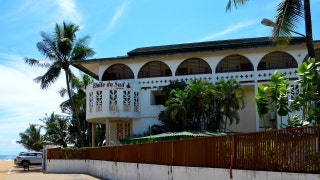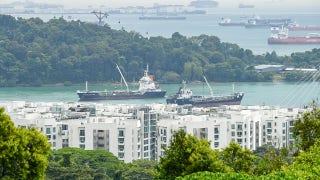Hong Kong coronavirus battle includes banning all touring arrivals, halting alcohol sales
Honk Kong is banning all tourist arriving into the country as well as halting the sale of alcohol at restaurants and bars.
Get all the latest news on coronavirus and more delivered daily to your inbox. Sign up here.
Freelance photojournalist Laurel Chor has been to 11 countries just since January, so she’s no stranger to long airport security checkpoints and even longer flights -- but traveling home to Hong Kong last week during the coronavirus pandemic was anything but routine.
After landing, she documented the seven-hour ordeal in a series of tweets that have garnered over 75,000 likes.
Chor, a Georgetown University graduate, spoke with Fox News about her experience flying from Paris to London, and finally taking a 12-hour flight to her home airport in Hong Hong.
All of the passengers wore masks on both of her international flights, Chor said. She noted, however, that not all flight attendants were wearing masks or gloves.
“It made me pretty uneasy,” Chor said. “I thought about how they are touching everyone’s cups, everyone’s rubbish,” and the close proximity between passengers and flight attendants when they lean over to pour drinks.
“I was just surprised that they didn’t feel more concerned. I was on a plane full of people going to Hong Kong who probably took this pretty seriously,” Chor explained.
Alternatively, she saw some passengers “in full bodysuits with face shields or with goggles and masks, and these are people just flying,” she described. “I think that’s overkill. Even people who work in COVID wards don’t protect themselves to that extent.”
Chor knew ahead of time that she would be tested for the coronavirus once she landed and was warned that the wait in the airport could take around eight hours to get her COVID-19 test results. Hong Kong residents who are returning home are required to self-isolate for 14 days, even if they test negative, to prevent the spread of the disease.
Along with a mobile phone app, she was given a tracking bracelet, which she is expected to wear around the clock, even in the shower. Not only was the bracelet meant to track the movement of residents and confirm they are staying home, but it also served as a deterrent.
“It’s the law now, you can’t break quarantine,” Chor said. The punishment is prison. “If someone saw me on the street with this bracelet they would probably report me.”
Chor was given a thermometer and told to document her temperature twice a day. She filled out paperwork and provided her phone number, so the government could call and confirm that she was respecting the post-travel quarantine. Passengers retrieved their luggage, cleared customs, and were taken by bus to a nearby convention center, transformed into the Temporary Specimen Collection Centre at the AsiaWorld-Expo.
Once in the testing center, the passengers’ bags were organized, and they were given luggage tags. Chor expected that the COVID test would be administered by a staff member, but instead they were each given a self-testing kit along with very specific, detailed instructions, and ushered to semi-private booths. “I was expecting the nose swab,” she said, but was relieved to find that instead the test involved saliva.
“It was simple enough, in retrospect,” Chor said, commenting that the numerous steps made the process nerve-racking in the moment. “The Hong Kong government is so meticulous." At the time, she wondered, “Am I spitting enough? You don’t want to mess it up, I wouldn’t want to have to do it again.”
After submitting her test, the wait began.
Chor noted that the chairs, set in spread-out rows, were about 70 percent occupied. Each chair had a desk, as well as a welcome note and “house rules.”
“I felt taken care of, the staff were really nice and patient. They really did seem to think of everything.” When they gave her a sandwich, she held on to half, thinking that it might be her only meal for the day. She was surprised when they came back around with snacks and water, and let her take an extra bag of cookies.
After a seven-hour wait, Chor’s results came back: She tested negative for COVID-19 and could go home.
A few days after returning home, she has already received a brief call from the government to confirm she understands the rules and has not left home.
At the end of the 14 days, Chor said she is expected to conduct a second test on her own to confirm she is still negative for the virus. The app is keeping track of the days, and she has heard of some citizens being checked on in-person or through video calls.
The Hong Kong government pays for all of the costs, which is just one reason that Chor believes that this process, now only reserved for repatriating Hong Kong citizens, isn’t scalable.
“A lot of people retweeted the thread, saying, ‘This is the future of travel’, but I don’t think any of that is true,” she shared. “Hong Kong is a small place, it’s a city of 7.5 million people, and we have our own borders that we control ourselves,” she said.
“It’s a government with a very large surplus, we can afford to do this. It’s a very limited number of people, only residents. Travel is very slow and tourist numbers have dropped by 100 percent,” Chor explained. “This isn’t a policy for anyone who wants to come in; this is for residents who want to come home. I can’t see a bigger place implementing these controls".
According to data from Johns Hopkins University, Hong Kong has only had 1,055 cases of the coronavirus and four deaths.
She said that the success of the restrictions is also thanks to a population that is on board with the measures. Restaurants often have temperature checks at the door and people wear masks. Neither are government policy; they are private decisions to keep people safe, Chor said.
CLICK HERE TO GET THE FOX NEWS APP
“In Hong Kong, they aren’t taking any chances,” she said. “We know how lucky we have it. Unlike the entire developed world, our cinemas are open, our restaurants are open, our bars are open and we want to keep it that way.”









































